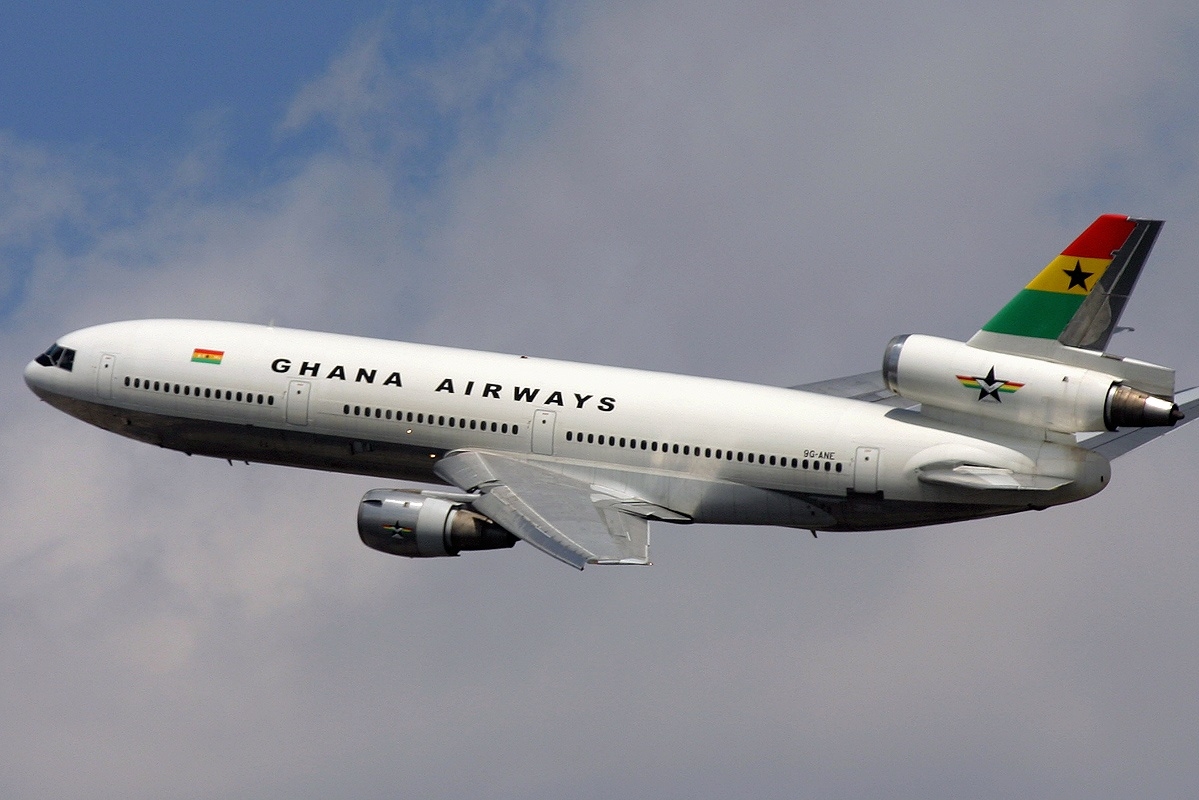
1. In the last decade, Ghanaians have seen their national airline dissolve twice. By 2004 Ghana Airways had been liquidated and was reformed as a public-private venture, which folded up in 2010. There were a number of reasons for the failure of both attempts to run a national carrier, but corruption and overstaffing were at the top of the list. From overpaying for services, to the purchasing of defunct planes to being banned from flying into the United States, in recent times national carriers have brought the country scandal and shame.
2. In June of 2002, a British creditor seized one of the airline’s DC- 10 planes at Heathrow Airport to recoup GBP 4 million in unpaid debts. When Ghana Airways ceased operations in 2004 the airline had debts of about USD 160 million for which the government and by extension the Ghanaian taxpayer were liable. The severance fees paid to former employees were in excess of five million dollars.
3. In 1958 – the year Ghana Airways began operations – the airline industry had a very different landscape. It was at the time dominated by state run airlines that depended on handouts from the state to function. Over time, this model has changed. Governments have become less willing to support the airline industry, which requires massive amounts of capital and turns profits between 1 -3% if at all. As the demand for air travel has expanded, so have the available options. Private carriers are able to offer the same services at lower costs and thereby cut national airlines – which tend to run inefficiently – out of the market. As a result, a number of national carriers such as Swiss air and Olympia air have folded up. State run airlines are also known for massive amounts of corruption and inefficiency.
4. According to an article in The Independent newspaper of the UK, published in April 2003, “the details of the forensic audit shows even the untrained management eye that a reckless and wanton dissipation of funds, abdication of responsibility and several other untoward management practices are the cause of Ghanair’s woes.” (Source, The Independent) The 2003 audit carried out by Messrs Worldwide Investment Company Limited revealed many alarming transactions, including an acquisition of two DC -9 planes in which the airline disbursed USD 7.65 million although the transaction cost USD 5 million. Where did the money go?
5. A prudent Investment?
Resurrecting Ghana Airways would be viable if we could guarantee sufficient start up costs – which would be in the hundreds of millions of dollars if Ghana Airways were to resume its old routes and be able to compete with the market players. An examination of the current state of the economy indicates that even if this were a prudent investment, now is not the time. The Ghanaian economy must be put right before talks concerning a new national airline are initiated. According to news sources, Dzifa Ativor, the Minister for Transport divulged that the government has initiated the process of resurrecting the national airline by contracting PwC Ghana as transaction advisors.
6. Over the last decade, the airline industry has seen expansions of 10% per annum in Ghana, and the passenger traffic hit 1 million last year. A cursory look at the figures points to an expanding industry that should be exploited. There are currently 28 airlines operating within the country, and the idea of resurrecting the national airline is to take a share of this market. The proposed stake of government ownership in the new airline is 51%, which is down from 70% government ownership with Ghana International Airlines but still constitutes a majority stake. The numbers in the airline industry makes it seem as though the growth of the market is profitable for airlines, and this is not necessarily the case. In the past year, Virgin Atlantic and Air Namibia have pulled out of Ghana due to unsustainable operating costs.
7. The dramatic depreciation of the cedi has created hard times for domestic airlines as well whose operating costs are in dollars although ticket fares are quoted in cedis. As of May this year, fly540 ceased operations indefinitely, and other market players such as Antrak and Starbow are making losses of about GHC 600,000 per month. Although consumer demand for air travel in Ghana continues to grow, the airline industry does not necessarily benefit in the form of profits. If the motivation for resurrecting the national airline is to increase revenue, it may very well yield the opposite.
8. It can be argued that the majority of the scandals regarding Ghana Airways and Ghana International Airways happened under different governments and things may be different under this government. Where the matter is concerned, it would be unduly optimistic to think that things will be better if we rebuild a national airline that is partially state owned. The state of the economy and the cedi’s rapid depreciation, as well as the GYEEDA and SUBAH messes do not inspire confidence in this government’s ability to succeed with a national airline where its predecessors have failed.
9. While the currency’s initial decline may not be the government’s fault – gold prices are at historic lows and this has affected export earnings – it failed to offer sound corrective policies if not worsen the situation with wasteful public expenditure in unmerited wages and salaries that delivered zero produtivity.
10. That a nation in talks with the IMF is considering reviving its national airline following two failed attempts points to a lack of priority. There are bigger issues to be tackled, including roads, fuel pricing and supply and the supply of electricity and water. Is a new Ghana Airways a prudent investment? The answer is no, a better economic climate might not change that answer either.
Source: Imani Ghana



